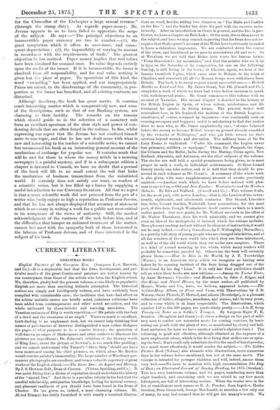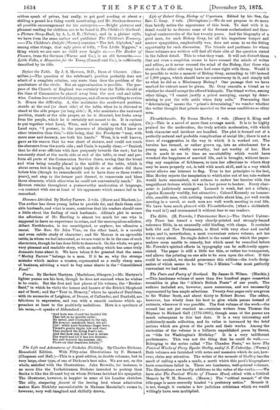CURRENT LITERATURE.
CHRISTMAS BOOKS.
English Painters of the Georgian Era. (Sampson Low. Marston, and Co.)—It is a deplorable fact that the lives. development, and par- ticular merits of the great Continental painters are better known by Our countrymen than those of the artists who form the English school. We, therefore, gladly hail the present volume, as one likely to popularise English art more than anything hitherto attempted. The historical notices are simply and intelligently written, and have evidently been eompiled with considerable care ; the incidents that have had effect on the artists' aesthetic career are briefly noted, judicious criticisms have been added from contemporaries and other noted art-critics, and the whole enlivened by characteristic and amusing anecdotes. The Venetian estimate of Etty is worth repetition,—" He paints with the fury of a devil and the sweetness of an angel." Where so much is excellent, fault-finding is an unpleasant task, but we cannot help thinking that names of pall-bearers of however distinguished a man rather disfigure the pages of what purports to be a concise history ; the quotation of well-known passages of Shakespeare and other authors to illustrate the pictures are superfluous ; Dr•. Johnson's criticism of the literary worth of King Lear, anent the picture of Newton's, is too much like padding ; and we cannot understand why Turner's " Slave Ship "should not have been mentioned among his chief pictures, on which alone Mr. Ruskin would rest the painter's immortality. The large number of Woodbury per- manent photographs are excellent, and form a valuable repertory of great works of the English schooL—The River Dee: its Aspect and history. By J. S. Howson, D.D., Dean of Chester. (Virtue, Spalding, and Co.) It was quite fitting that a divine of reputation should undertake the history of the " sacred Dee." And there is a peculiar• felicity in the fact that the needful scholarship, antiquarian knowledge, feeling for natural scenery, and pleasant readiness of pen should have been found in the Dean of Chester. He has given us, indeed, a most charming volume. Mr. Al red Rimmer has richly furnished it with nearly a hundred illustra- tions on wood, besides adding two chapters on "The Halls and Castles on the Dee "; and the binder has done his part with the exterior satis- factorily. After an introduction on rivers in general, and the Dee in par- ticular, we have a chapter on Bala Lake. Of the next, Owen Glendower is the subject; and here we may remark in passing that the Dean does not re- cognise that Shakespeare's account of the Welsh hero is obviously intended to leave a ridiculous impression. We are conducted down the course of the river, and introduced as we pass to associations old and new. So at Wrexham we are told that Heber hero wrote his famous hymn, "From Greenland's icy mountains," and that the printer who set it up in type on the Saturday of its composition, for use on the following Sunday, is still living in the town ; at Chester, again, we hear of the famous twentieth legion, which came over to Britain in the reign of Claudius, and remained till all the Roman troops wore withdrawn from Britain. The book is in every respect a moat successful one.—British Battles on Land and Sea. By James Grant, Vol. III. (Cassell and Co.), completes a work of which we have had twice before occasion to speak with well-deserved praise. Mr. Grant commences this volume with an account of Navarino. His second chapter is devoted to the history of the British Legion in Spain, of whose valour, misfortunes, and ill- treatment he speaks in fitting terms. The present writer well remembers how, in his boyhood, the uuiform of the British Legion— sometimes, of coarse, assumed by impostors—was continually seen on crossing-sweepers and beggars; and it is satisfactory to find due justice done to men who, as Mr•. Grant emphatically save, "always behaved before the enemy as became British troops on ground already ennobled by the victories of Wellington," and who got little return for their• services beyond wounds and starvation. The military fame of Sir De Lacy Evans is vindicated. "Under his command, the Legion never lost prisoners, artillery, or equipage." China, the Punjaub, the Cape, the Crimea and the Baltic, India during the Mutiny, China again, New Zealand, Abyssinia, and Ashantee, are the chief subjects of the volume. The stories are well told, a special prominence being given, as is most proper in such a work, to individual achievements. Of these formal history rarely can take notice, and it is well that they should be pre- served in such volumes as Mr. Grant's. A summary of the whole• work is also given, with some supplementary account of events previously omitted.—Another work which we have before noticed with plea- sure is carried on,— Old and New London : WestadnAter and the Western Suburbs. By Edward Walford. (Cassell and Co.) —This volume deals, [or the most part, with newer London,—that is, the London of the seven- teenth, eighteenth, and nineteenth centuries. The Strand, Lincoln's Inn, Soho, Covent Garden, Whitehall, have associations, for the most part, of this date, though Westminster itself carries us back to a much earlier period. Our now guide, for• Mr. Walford succeeds to the office of Mr. Walter Thornbury, does his work admirably, and we cannot give even an idea of the multiplicity of interest which his volume includes. More pleasant reading, and not without its element of instruction, it would not be easy to find.—hlrby Guardians, by F. Willoughby (Macmillan), is a prettily told story of young people who are changed into fairies, and of all the wonders of the new world into which they are thus introduced, as well as of the old world which they see under new auspices. There is a kind of second meaning in the whole, which many readers will probably be somewhat puzzled by. Otherwise, the book will certainly please them.—liou, to Rise in the World, by J. T. Trowbridge (Warne), is an American slay, which we recognise as having seen before by its opening incident of the hero being dragged out of the Erie Canal by his dog "Lion." It is only fair that publishers should toll us when their books are new effitions.---Among the Tartar 7'ents, by Anne Bowman ; Cavaliers and Roundheads, by John J. Edgar, and Sea-Kings and Naval Heroes, by the same author, all published by Messrs. Warne and Co., have, we believe, appeared before.—The Golden-limp Album, in Prose and Verse, with Illustrations by J. D. Watson, Oscar Pletscb, P. Hertzol, and others (Routledge), is a pleasant collection of fables, allegories, anecdotes, and stories, told in easy prose, and in verso which is at least respectable. The illastrationa, which number 152 to the 390 pages, are particularly pretty.—A to Z, being Twenty-six Notes on a Soldier's Trumpet. By Surgeon-Major F. E. Scanlon. (Houghton and Gunn.)—Is there a design on the part of mili- tary men to render our nurseries nests for coming warriors, by fasci- nating our youth with the glory of war, as manifested by showy and bril- liant uniforms, for here we have another soldier's alphabet-book ? The colouring is good and effective, although obtained at the expense of a most unpleasant odour, which is the first thing that strikes one on open- ing the book. If art could only substitute for this the smell of burnt powder, how much more effectively it would render the subject.—The Golden Picture Book (Nelson) also abounds with illustrations, more numerous than in the volume before mentioned, but not of the same merit. The volume is intended for younger children, and will, indeed, amuse them very well.—We have to mention with high commendation The Day of Rest ; an Illustrated Journal of Sunday Reading, for 1875 (Strahan). This is a very handsome volume, and its pages, numbering more than eight hundred, and containing each we are afraid to say how much letterpress, are full of interesting matter. When the reader sees in the list of contributors such names as R. A. Proctor, Jean Ingelow, Heeba Stratton, Dora Greenwell, George Macdonald, to mention a few only out of many, he may feel assured that he will get his money's-worth. We seldom speak of prices, but really, to get good reading at about a shilling a pound is a thing worth mentioning, and Mr. Strahan deserves all possible encouragement for his enterprise.—Bright pictures and pleasant reading for children are to be found in The Children's Garland: a Picture Story-Book, by A. L. 0. E. (Nelson), and in a plainer style, We have from the same author and publisher The Children's Treasury. —The Children's Delight (Warne) contains " The Ark Alphabet," and among other things, that ugly piece of folly, "Ten Little Niggers," a thing which we are sure no child ever laughs at.—The Basket of Flowers, from the German (Warne and Co.), is an old favourite.— Little Folks, a Magazine for the Young (Cassell and Co.), is sufficiently described by its title.



































 Previous page
Previous page